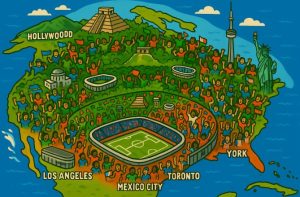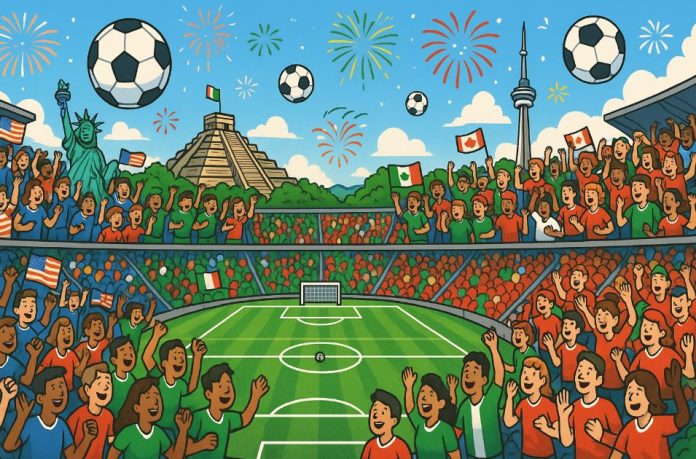Table of Contents
The FIFA World Cup 2026 promises to be the most ambitious and inclusive edition in the tournament’s history. With a record number of teams, three host nations, and cutting-edge technology, it’s poised to redefine the footballing experience for fans worldwide.
For audiences in London and across the UK, this is more than a summer tournament it’s a cultural and sporting milestone worth preparing for.
Which Countries Are Hosting the FIFA World Cup 2026?

The 2026 World Cup will be hosted jointly by the United States, Mexico, and Canada marking the first time the event is spread across three nations.
This tri-nation arrangement reflects FIFA’s growing ambition to globalise the sport and accommodate the logistical demands of an expanded tournament.
The United States will take on the lion’s share of hosting responsibilities, with 60 matches planned across 11 cities. Mexico and Canada will each host 10 matches, bringing a rich blend of cultures, climates, and footballing heritage into the global spotlight.
This setup not only enhances the fan experience but also represents a new model of shared responsibility and collaboration in global sport.
How Will the 48-Team Format Change the Tournament?
One of the most notable changes for the 2026 tournament is the expansion from 32 to 48 teams. This format allows more countries particularly from Africa, Asia, and North America to participate, increasing global representation and viewership.
The tournament will feature 12 groups of four teams, a departure from the traditional eight. The top two teams from each group, along with the eight best third-placed teams, will progress to the knockout stages, creating a larger and more unpredictable Round of 32.
While the increased number of matches (rising from 64 to 104) raises concerns about player fatigue and scheduling, it undeniably brings a greater level of excitement and opportunity to emerging football nations.
What Are the Key Dates and Match Schedule for World Cup 2026?
Although the official match fixtures are yet to be finalised, FIFA has confirmed that the tournament will begin on 11 June 2026 and conclude with the final on 19 July 2026.
The group stage is expected to run through the first two weeks, followed by the knockout rounds extending into mid-July.
Fans can expect an intensive schedule packed with thrilling matchdays, as the tournament will now span nearly 40 days to accommodate the additional teams and fixtures.
The full match calendar, including team pairings and specific venues, is likely to be released by FIFA in 2025.
Where Will the FIFA World Cup 2026 Matches Be Played?

The matches will be spread across 16 cities in the United States, Mexico, and Canada, each offering a unique atmosphere and footballing environment.
Major stadiums like the MetLife Stadium in New Jersey, AT&T Stadium in Dallas, and Estadio Azteca in Mexico City are expected to host high-profile matches, including the final and semi-finals.
The selected cities span a wide geographic range from the bustling streets of Los Angeles and Toronto to the historic pitches of Mexico City.
This geographical diversity ensures fans will experience the tournament in various cultural and climatic settings, adding depth to the global celebration of football.
How Can Fans Get Tickets for the World Cup 2026?
Ticket sales for the World Cup 2026 are expected to open in mid to late 2025, through FIFA’s official platform, FIFA+. Fans in the UK, especially those based in London, are advised to register early and monitor official announcements to secure their seats.
Tickets will likely be distributed in phases, beginning with a random draw followed by first-come-first-served sales. Hospitality packages, which include premium seating and exclusive experiences, will also be available for those looking to upgrade their matchday experience.
Travelling fans should also be aware of potential visa requirements for each country, and it’s recommended to begin travel planning and budgeting well in advance to avoid last-minute complications.
What Is the Opening Match and Where Will the Final Take Place?
While FIFA has not yet announced the full fixture list, it is widely anticipated that the opening match will be held at Mexico City’s legendary Estadio Azteca, which hosted the 1970 and 1986 World Cup openers. This nod to football history is fitting for such a landmark tournament.
The final match is likely to be staged at MetLife Stadium in New Jersey, given its capacity, location, and modern infrastructure.
Hosting the final in the New York metropolitan area would provide maximum global exposure and logistical advantages, cementing its place in football history.
What Innovations and Technologies Will Be Introduced in 2026?

The World Cup 2026 will be a showcase of how sport and technology can merge to deliver an enhanced fan and player experience.
FIFA plans to roll out advanced VAR systems, including semi-automated offside detection powered by artificial intelligence. These tools are expected to speed up decision-making and reduce on-field controversies.
Augmented reality experiences, smart ticketing with facial recognition, and app-based fan interactions will make the stadium experience smoother and more interactive.
Furthermore, FIFA is committed to a sustainable tournament, incorporating renewable energy and eco-conscious transport to minimise the environmental footprint across all venues.
How Will the World Cup 2026 Impact Tourism and Local Economies?
Hosting the World Cup is not just about football. it’s a powerful economic engine. The combined tourism impact on the USA, Mexico, and Canada is projected to exceed $8 billion, with businesses in hospitality, transport, and retail set to benefit immensely.
For UK-based tour operators, the tournament opens up valuable opportunities to offer custom travel packages.
Fans from London can explore curated experiences that combine match attendance with city tours, local cultural events, and culinary adventures across the host nations.
Additionally, host cities are investing heavily in infrastructure improvements, which will continue to benefit residents and tourists long after the final whistle.
What Teams Have Qualified and Who Are the Favourites?
As of now, only the host countries USA, Canada, and Mexico have guaranteed spots in the tournament. Qualification campaigns across the six FIFA confederations are ongoing and will continue through 2024 and 2025.
Traditional football giants like Brazil, France, Argentina, and England are considered strong contenders. England’s recent performance in international tournaments has reignited optimism among fans, and many will be hoping this could be the squad’s moment of glory.
Underdog teams from Africa and Asia will also have more chances to shine, thanks to the expanded format, which provides greater opportunities for surprise upsets and emerging stars.
How Can Fans from London Prepare for the World Cup 2026?

For fans in London, travelling to a tri-nation tournament across North America requires careful preparation.
Securing an ESTA for the United States, an eTA for Canada, and a tourist visa for Mexico should be prioritised. With flight durations averaging between 7–10 hours, early booking will help reduce costs and improve flexibility.
Fans should also explore accommodation options early, especially near popular stadiums. Many host cities are offering fan packages that include transport and match tickets, making it easier to navigate unfamiliar locations.
Travel insurance, international mobile coverage, and budgeting apps can all enhance the experience and reduce stress during the journey.
What Is the Role of FIFA in Ensuring a Fair and Inclusive Tournament?
FIFA is actively working to position the 2026 tournament as a model for fairness, inclusivity, and innovation. The governing body is implementing robust anti-discrimination policies, social responsibility initiatives, and sustainability frameworks.
This includes real-time monitoring of online abuse, stronger representation for minority groups, and community outreach programmes within host cities.
By fostering diversity and inclusion on and off the pitch, FIFA aims to deliver a tournament that reflects the global spirit of the sport.
What Can Fans Expect from the Matchday Experience?
Attending a World Cup match in 2026 will be unlike anything football has offered before. Fans can expect cutting-edge stadiums with seamless digital experiences, multilingual support services, and immersive fan zones.
Each host city will bring its own flair whether it’s vibrant street parties in Mexico, cutting-edge food trucks in American cities, or cultural showcases in Canada.
With local artists, musicians, and communities involved, the World Cup will feel more like a global festival than just a football tournament.
How Will This World Cup Shape the Future of International Football?

The World Cup 2026 will not just break records. it will set a new benchmark for what global football events can achieve.
From inclusive competition formats to sustainable practices and technological advancements, it will influence how future tournaments are designed and delivered.
The legacy of this tournament may be felt in grassroots football initiatives, expanded youth engagement, and even in how leagues and clubs adapt to larger international calendars.
For fans and players alike, 2026 represents the future of football, played on the biggest stage ever imagined.
Conclusion
The FIFA World Cup 2026 is shaping up to be a transformative moment in football history. With more teams, more matches, and more nations involved than ever before, the spectacle will be unrivalled in scale and diversity.
Whether you’re planning to travel across the Atlantic or follow from the pubs of London, this World Cup will offer stories, emotions, and memories that last a lifetime.
Now is the time to prepare, engage, and be part of a tournament that promises to deliver not just great football but a global celebration of unity through sport.
FAQs
Will all 48 teams play in the group stages?
Yes, all qualified teams will be placed into 12 groups of four, with the top two and select third-placed teams moving into the knockout phase.
What cities in the USA will host matches?
Cities include New York/New Jersey, Los Angeles, Dallas, Miami, Seattle, and more each selected for their facilities and football culture.
When will World Cup 2026 tickets go on sale?
FIFA is expected to open ticket registration and sales in phases starting from mid-to-late 2025.
Are there any safety concerns for travellers?
The host countries have strong infrastructure and security measures, and FIFA is coordinating closely with local authorities to ensure fan safety.
Will the UK be broadcasting the matches live?
Yes, UK broadcasters like the BBC and ITV are expected to cover the full tournament with live TV and streaming options.
How will climate and weather affect matches?
Fixtures will be scheduled carefully to mitigate heat and humidity, especially in US and Mexican host cities.
What role will local communities play in hosting?
Host cities will involve local volunteers and cultural groups to welcome fans and offer community-led events throughout the tournament.

